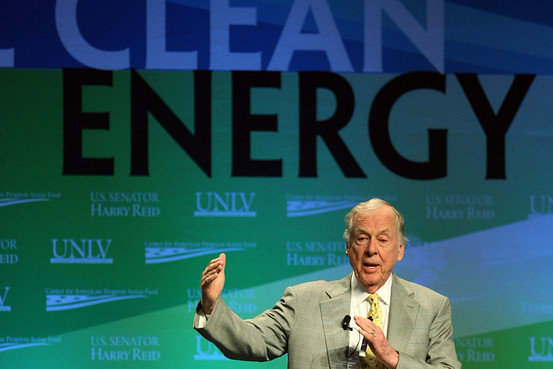By Alison Sider
Escalating violence in Iraq is another reminder that the U.S. can – and should – wash its hands of OPEC, billionaire natural gas tycoon T. Boone Pickens said on Monday during an interview in Houston, Tex.
Despite a drilling boom in the U.S., the country still imports crude oil from members of the Organization of the Petroleum Exporting Countries, including Iraq. But the right tax incentives could help change that, he said.
Mr. Pickens bemoaned the fact that U.S. policy in the Middle East still reflects fears dating back to the 1973 Arab oil embargo when it appeared that America would always be dependent on oil supplies from the region. As the U.S. and Canada pump more oil and gas, the market is changing and policymakers need to do a rethink.
“The dynamics and everything has changed in the world and we still approach it the same way we did 20 years ago,” he said.
One alternative: natural gas could challenge gasoline and diesel to fuel more cars and trucks.
Mr. Pickens has been a natural gas evangelist for years, though its adoption as a mainstream transportation fuel has taken longer than he would have liked. That’s beginning to change as companies like Waste Management, the largest garbage hauler and recycler in the U.S., have shifted their fleets to run on compressed natural gas. CNG is less expensive than diesel and cleaner burning than the oil-derived fuel.
Mr. Pickens and Waste Management Chief Executive David Steiner said the move to natural gas-burning vehicles is coming one way or another, but would happen faster if the government helps fund needed infrastructure like fueling stations, and offers tax incentives to defray the more expensive up-front cost of buying trucks and cars that run on natural gas.
“If you got the federal government to say ‘let’s build out the natural gas infrastructure,’ you could move the entire transportation industry to natural gas in 5-10 years. Otherwise it’s going to take a longer period of time,” Mr. Steiner said.
Mr. Pickens says there’s no reason to wait.
“You could knock OPEC out, 75% of it, with heavy-duty trucks” running on natural gas instead of diesel, he said. “You have so much leverage by having our own fuel in the US, it’s incredible. But you don’t have any leadership in Washington.”
While a cheerleader for U.S. use, American gas exports can’t solve every international problem. There’s a lot of energy company and political enthusiasm behind prospects for U.S. exports of liquefied natural gas, especially as the EU frets about its gas dependence on Russia, but Mr. Pickens thinks the allure of sending natural gas overseas will lose steam in the coming years.
“It will be a lot of conversations about exports, but when it’s all said and done, the market will be here,” Pickens said.
The first gas export facility in the Lower 48 is expected to start shipping U.S. gas abroad next year, and many more projects are in various stages of the permitting process.
“I don’t think there will ever be many permits, when it’s all said and done, for LNG,” Mr. Pickens said. “And if there are, fine. We’ve got plenty of gas.”

